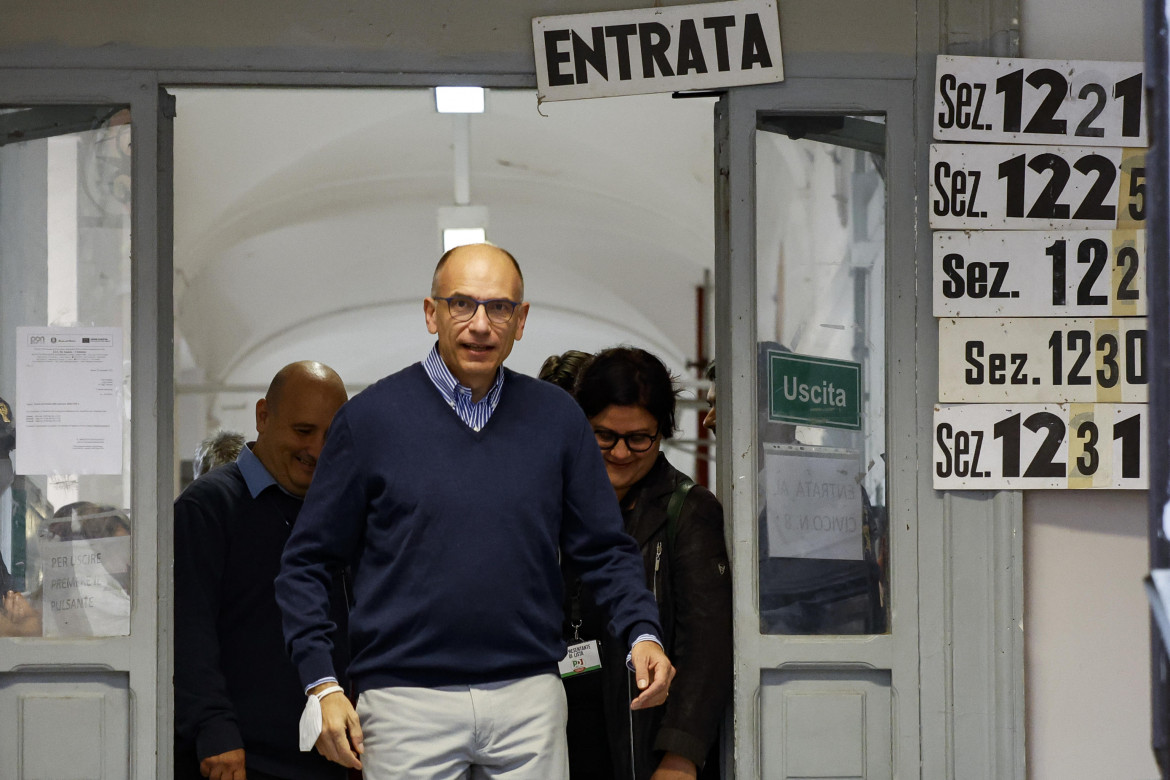Commentary
Letta’s darkest night, a breakdown of the center-left and the decline of the PD
Letta's resignation is predictable, but the defeat is a blow to the entire leadership group, from former Renzians to the internal left.

Around midnight, the nightmare began to take shape at Largo del Nazareno, the Rome headquarters of the PD. The first projections put the party below 20%, the psychological threshold for its survival. The night had just begun, but by then all that remained to be seen was whether or not the party would fall below Matteo Renzi’s 2018 result of 18.7%, which Letta had repeatedly called “disastrous.”
The secretary was locked away in his room on the third floor with his loyalists. The bigwigs were all there. There was even a room dedicated to Roberto Speranza with all those from Article 1, who had left the Renzi-led PD in 2017 and are now back, from Nico Stumpo to Alfredo D’Attorre.
The exit polls had been punishing, and the projections painted a grim picture. Until after 1 a.m., in the large press room on the third floor, no one, not even an MP, could be seen. “We cannot comment on such general exit polls.” And yet, the later projections confirmed the trends. In fact, they were even worse: 20% was not attainable.
Yet no one had the courage to go out and put their face to it. Until Chamber group leader Debora Serracchiani finally appeared, in a dark mood, and spoke of a “sad evening for the country.”
“We cannot avoid admitting that the victory has gone to the right, propelled by Giorgia Meloni,” was the formula she used. And she stressed that the right “is not a majority in the country.” Hence the “responsibility” of the PD as “the second political force and first opposition force.” Serracchiani pointed to the poor results of the Lega (“They will reflect on this as well”) and of Calenda, who “did not achieve the goals he set out for himself,” and then returned to the “responsibility” that the PD will have “in the next Parliament and in front of Europe, at many junctures that will be delicate.”
According to Youtrend’s estimates, the PD will have a hundred MPs between the Chamber and Senate: 65 at Montecitorio and 33-34 at the Palazzo Madama. Many fewer than expected, in part because the wins in uninominal constituencies are very few, less than a dozen and concentrated between the areas of Bologna and Florence and a few other metropolitan centers.
The result is even below the expectations circulating at Nazareno before the polls closed. Defeat was taken for granted, but they hoped the party would surpass the 20% threshold and limit the majority gathered around Giorgia Meloni. But no: the whole strategy put in place by Letta since July 20, after Draghi’s downfall, proved to be a failure. Loyalty to the Draghi agenda, the rift with the M5S, the very bellicose line taken on Ukraine, the social turn, written in the program but communicated without conviction, the choice to polarize the campaign into a two-way clash with Meloni.
For the PD, this is more than just the second consecutive defeat in a general election, after Renzi’s in 2018. This time, the very survival of a political project that has never wanted to choose between left and center, and has deluded itself that it can simultaneously be a party of the establishment and the leader of the center-left, is put into question.
The congress is scheduled for early 2023; it will probably be brought forward. Letta’s resignation is predictable, but the defeat is a blow to the entire leadership group, from former Renzians to the internal left, including the Article 1 squad, which decided to return to the PD after the 2017 split together with Roberto Speranza and Bersani.
The night dragged on in the large courtyard at Nazareno, filled with TV crews waiting in vain for some other leader to come out and comment on the result. It was the darkest night for Letta, perhaps worse than the one in 2014 when the party led by Renzi kicked him out from the Palazzo Chigi. On Friday, he had wanted everyone on stage in Piazza del Popolo for the rather dour final rally, from governors (Emilia’s Bonaccini could be a candidate for the leadership) to ministers and figures from all the internal wings of the party: as if saying that this defeat belonged to everyone, that he refused to be the scapegoat.
And yet it is clear that, a year and a half after his return from Paris, after he won two rounds of municipal elections, Letta’s political trajectory is once again going downhill. Perhaps permanently. His red-and-black themed campaign with the slogan “Choose” led to a clear result: the Italians chose Giorgia Meloni, at least six points above the PD. Now the only question left is whether his resignation will come as early as in the next few days, or whether the PD mayors will ask Letta, in extremis, to lead the party until an early congress, perhaps at the end of the year.
It’s certainly true that among the words being exchanged in the corridors at Nazareno, many are whispering that “Enrico was wrong to tie us to the Draghi agenda.” And, obviously, he was wrong to write off the M5S as finished. So many mistakes, too many and too close together, that this time might spell the death of the PD.
Originally published at https://ilmanifesto.it/la-notte-piu-buia-di-letta-per-il-pd-una-sconfitta-catastrofica on 2022-09-26
